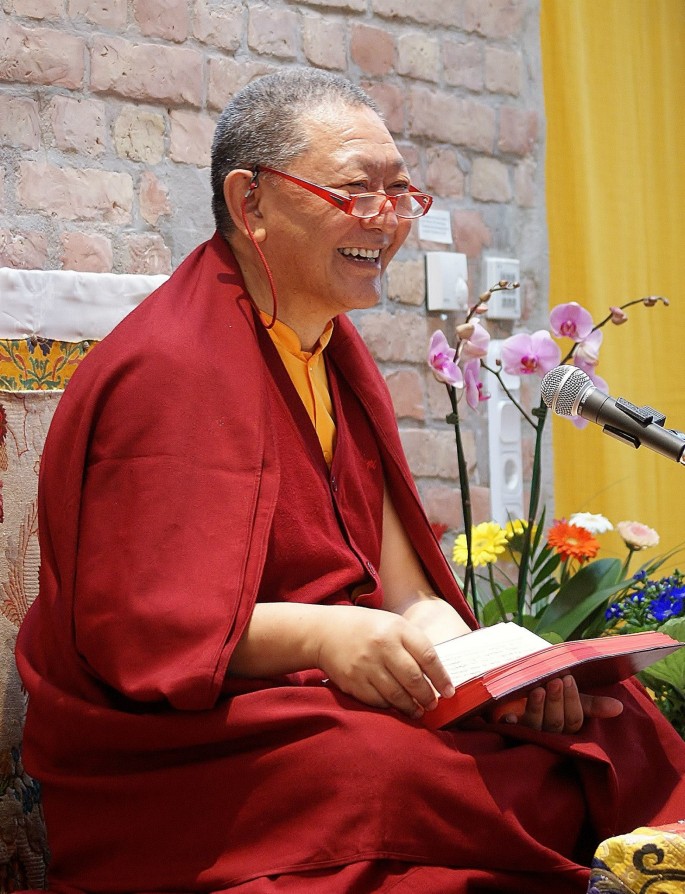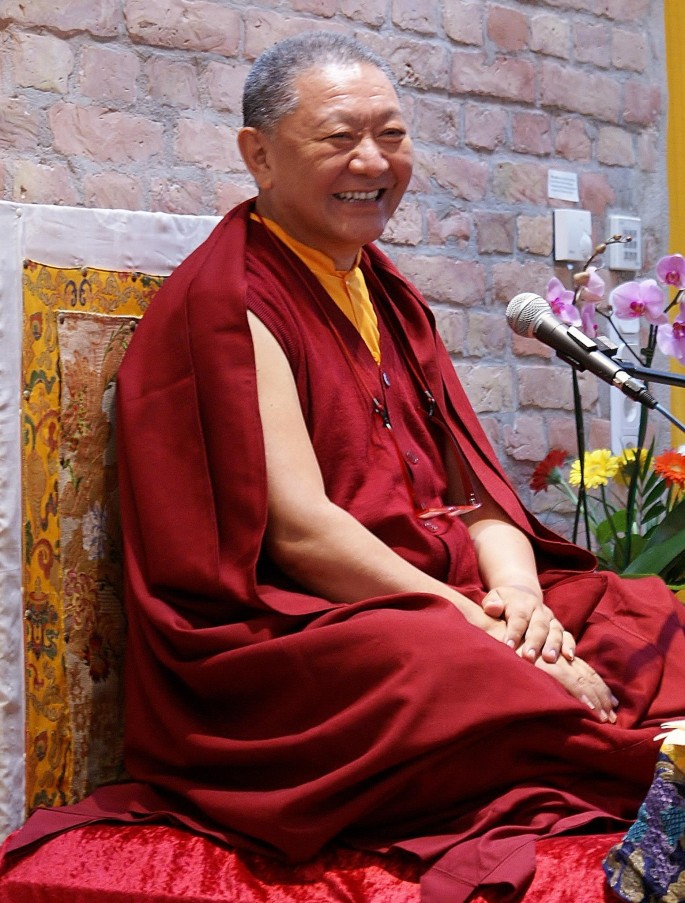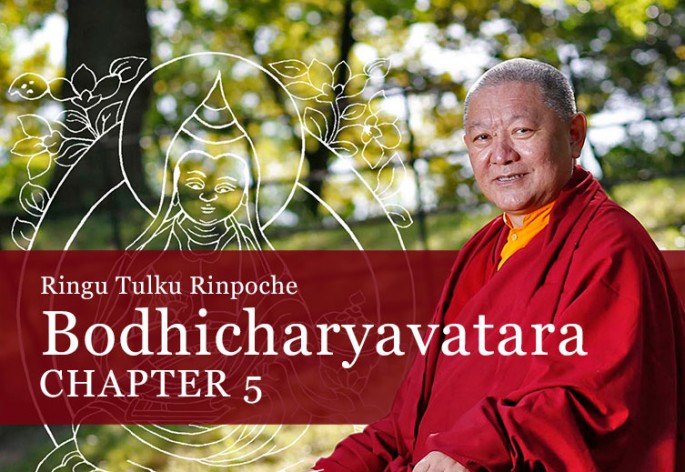News - Teachings
BA6Q2 Questions and Answers 2 (Chapter 6)
On April 13, 2013 in Bodhicharyavatara, Chapter 6, Teachings
With video BA6Q2 Ringu Tulku kindly answers the questions submitted regarding stanzas 12 to 53 of the Sixth Chapter of the Bodhicharyavatara.
Rinpoche is now in Switzerland attending the teachings of His Holiness the Dalai Lama. Some of the events are streamed live at http://www.dalailama2013.ch.
To view the video, simply click on the image to view all the Chapter 6 videos.
(more…)
Summary of Shedra Survey Is Now Available
On March 30, 2013 in Bodhicharyavatara, News, Teachings

Warmest thanks to everybody who participated in the Shedra Survey in January!
A pdf summary of the survey is now available for downloading from the Survey Page.
Many of you will have the wonderful opportunity to meet Rinpoche on his Spring Tour. We expect to receive new video teachings from Rinpoche during his tour, although less regularly.
Photo: Cesare Saguato, 2013.
BA6_50-53 Practising Patience Under Humiliation
On March 23, 2013 in Bodhicharyavatara, Chapter 6, Teachings
With his commentary on stanzas 50 and 51 Rinpoche completes the section on how to practise patience towards those who cause us harm, and then begins the section on how to practise patience under humiliation and insult, with stanzas 52 and 53 of the Sixth Chapter of the Bodhicharyavatara. (BA6_50-53)
To view the video, simply click on the image to view all the Chapter 6 videos.
(more…)
BA6_34-49 No Reason to Be Angry with Those Who Harm Us
On March 16, 2013 in Bodhicharyavatara, Chapter 6, Teachings
The third way of practising patience towards those who are causing us harm is by understanding why it is not reasonable to be angry with them. This is Rinpoche’s commentary on stanzas 34 to 49 of the Sixth Chapter of the Bodhicharyavatara. (BA6_34-49)
To view the video, simply click on the image to view all the Chapter 6 videos.
(more…)
BA6_22-33 Looking at the Nature of Things
On March 9, 2013 in Bodhicharyavatara, Chapter 6, Teachings
With video BA6_22-33 Rinpoche gives his commentary on stanzas 22 to 33 of the Sixth Chapter of the Bodhicharyavatara. The second way to practice patience towards those who have given us pain and problems is by understanding the way things are; that everything is conditional and interdependently arising.
To view the video, simply click on the image to view all the Chapter 6 videos.
(more…)
BA6Q1 Questions and Answers 1 (Chapter 6)
On March 2, 2013 in Bodhicharyavatara, Chapter 6, Teachings
With video BA6Q1 Rinpoche answers some questions concerning stanzas 1-11 of Chapter 6 of the Bodhicharyavatara.
To view the video, simply click on the image to view all the Chapter 6 videos.
(more…)
BA6_12-21 Forbearance of Suffering
On February 23, 2013 in Bodhicharyavatara, Chapter 6, Teachings
With video BA6_12-21 Ringu Tulku gives a commentary on stanzas 12 to 21 of the Sixth Chapter of the Bodhicharyavatara. This starts the detailed explanation on the actual practice of patience, which Rinpoche first outlines. Then, the first subsection to go through is how to practice patience towards those who have given us pain and problems. There are three ways to do so, and the first of them is forbearing the sufferings.
To view the video, simply click on the image to view all the Chapter 6 videos.
(more…)
BA6_11 The Object of Patience
On February 15, 2013 in Bodhicharyavatara, Chapter 6, Teachings
With video BA6_11 Rinpoche gives a commentary on stanza 11 of the Sixth Chapter of the Bodhicharyavatara, which outlines the 72 objects of our practice of patience. Most of the times when we get angry or upset, one of these 72 things is the reason of our anger. We should try to understand this process and see whether it’s really of any use to get angry. Then we will be motivated to work on our patience and use the remedies that will be discussed in the following stanzas. This is how we cultivate our emotional intelligence.
To view the video, simply click on the image to view all the Chapter 6 videos.
(more…)
BA6_6-10 Anger Is the Enemy
On February 8, 2013 in Bodhicharyavatara, Chapter 6, Teachings
With video BA6_6-10 Rinpoche continues his commentary on Shantideva’s analysis of anger and why it is so destructive. These are stanzas 6 to 10 of the Sixth Chapter of the Bodhicharyavatara.
To view the video, simply click on the image to view all the Chapter 6 videos.
If you prefer listening to the teaching in audio, use the audio player below.
The audio as well as the audio translations in different languages and the transcript of this teaching are all available on Chapter 6 page.
We are also studying the commentary transcript on Chapter 6, which you can download here and in the Library. Further recommended reading: the commentary book by Kunzang Pelden (Khenpo Kunpal), The Nectar of Manjushri’s Speech, p. 200-201.
You’re questions are most welcome. Please log in and leave your questions for Rinpoche as a comment below, or send them via email to studyquestions[at]bodhicharya.org. It is helpful if you can use one short paragraph and, if possible, less than 80 words. Any questions longer than that may have to be edited so please be concise. Questions will be collected from here on Friday, February 15, 2013, and included in Rinpoche’s answers video. After that date please send any questions relating to this video teaching via email to studyquestions[at]bodhicharya.org.
If you would like to volunteer in making transcripts of Rinpoche’s shedra teachings, or in making audio translations to your own language, please email us at shedra[at]bodhicharya.org.
BA5Q6 Questions and Answers 6 (Chapter 5)
On February 1, 2013 in Bodhicharyavatara, Chapter 5, Teachings
With video BA5Q6 Rinpoche answers the concluding questions concerning Chapter 5 of the Bodhicharyavatara.
To view the video, simply click on the image to view all the Chapter 5 videos.
If you prefer listening to the teaching in audio, use the audio player below.
The audio as well as the audio translations in different languages and the transcript of this teaching are all available on Chapter 5 page.
If you would like to volunteer in making transcripts of Rinpoche’s online teachings, or in making audio translations to your own language, please email us at shedra[at]bodhicharya.org.
Shedra Survey Reminder
On January 26, 2013 in Bodhicharyavatara, Teachings

Dear Friends,
We’d like to encourage anyone who has not already completed the Shedra Survey to please do so, if you can, before the deadline on January the 31st.
We have already had a good response, but everyone’s contribution would be welcome so that we can make the Online Shedra as good and easy to follow as possible.
If you find any difficulty in responding to the survey or in using the website in general, don’t hesitate to let us know through the contact form or via email to shedra[at]bodhicharya.org or to webmaster[at]bodhicharya.org.
Thank you for your responses so far!
Photo by Cesare Saguato, 2013.
Shedra Survey for Bodhicharya Online Shedra Students
On January 19, 2013 in News, Teachings

Dear Friends,
It would be extremely helpful if you could take a few moments to fill in our survey, on how you have found the Online Shedra so far, and how it might best continue as we move forward.
Please click here to open the survey:
Thank you!
Photo: Cesare Saguato, 2013.
BA6_1-5 Patience
On January 4, 2013 in Bodhicharyavatara, Chapter 6, Teachings
We are now starting the Sixth Chapter of the Bodhicharyavatara, Patience, with Rinpoche’s teaching on stanzas 1 to 5. Emotions of anger and hatred are regarded as the opposite of bodhichitta. In order to get rid of them we need to practice patience.
To view the video, simply click on the image to view all the Chapter 6 videos.
If you prefer listening to the teaching in audio, use the audio player below.
The audio as well as the audio translations in different languages and the transcript of this teaching are all available on Chapter 6 page.
We are also studying the commentary transcript on Chapter 6, which you can download here and in the Library. Further recommended reading: the commentary book by Kunzang Pelden (Khenpo Kunpal), The Nectar of Manjushri’s Speech, p. 197-200.
You’re questions are most welcome. Please log in and leave your questions for Rinpoche as a comment below, or send them via email to studyquestions[at]bodhicharya.org. It is helpful if you can use one short paragraph and, if possible, less than 80 words. Any questions longer than that may have to be edited so please be concise. Questions will be collected from here on Friday, January 11, 2013, and included in Rinpoche’s answers video. After that date please send any questions relating to this video teaching via email to studyquestions[at]bodhicharya.org.
If you would like to volunteer in making transcripts of Rinpoche’s shedra teachings, or in making audio translations to your own language, please email us at shedra[at]bodhicharya.org.
Some Self Study Questions for the Bodhicharyavatara, Chapter 5
On December 29, 2012 in Bodhicharyavatara, Chapter 5, Teachings
Last week we finished the Fifth Chapter of the Bodhicharyavatara, Vigilant Introspection. The New Year will begin with a new chapter — Chapter 6, Patience — which we will start next weekend.
This is again a set of questions you can use to self assess your knowledge and understanding of the teachings relating to the chapter we have just studied through. Please feel free to use these questions as you find helpful. Here you can download them as a pdf file.
You may answer these questions either from your memory alone or by referring to the materials you have available. Answers can be found in the video teachings listed below, but you can also refer to the root text The Way of the Bodhisattva, the transcript of Rinpoche’s teachings from 1997-2001 or the commentary book by Khenpo Kunpal.
BA5_71-75 How to Accumulate More Positive Deeds. Part 1
On December 23, 2012 in Bodhicharyavatara, Chapter 5, Teachings
With video BA5_71-75 Rinpoche continues on the second of the three disciplines, the actual accumulation of positive deeds, as discussed in stanzas 71 to 75 of the Fifth Chapter of the Bodhicharyavatara.
To view the video, simply click on the image to view all the Chapter 5 videos.
If you prefer listening to the teaching in audio, use the audio player below.
The audio as well as the audio translations in different languages and the transcript of this teaching are all available on Chapter 5 page.
We are also studying the commentary transcript on Chapter 5, which you can download here and in the Library section. Further recommended reading: the commentary book by Kunzang Pelden (Khenpo Kunpal), The Nectar of Manjushri’s Speech, p. 185-186.
You’re questions are most welcome. Please log in and leave your questions for Rinpoche as a comment below, or send them via email to studyquestions[at]bodhicharya.org. It is helpful if you can use one short paragraph and, if possible, less than 80 words. Any questions longer than that may have to be edited so please be concise. Questions will be collected from here on Friday, November 30, 2012, and included in Rinpoche’s answers video. After that date please send any questions relating to this video teaching via email to studyquestions[at]bodhicharya.org.
If you would like to volunteer in making transcripts of Rinpoche’s online teachings, or in making audio translations to your own language, please email us at shedra[at]bodhicharya.org.
BA5_97-109 Additional Instructions & Conclusion
On December 22, 2012 in Bodhicharyavatara, Chapter 5, Teachings
With video BA5_97-109 Ringu Tulku gives some additional instructions for the bodhisattva practice from stanzas 97 to 107 of the Fifth Chapter of the Bodhicharyavatara, Vigilant Introspection. The chapter is then concluded with stanzas 108 and 109.
“But all this must be acted out in truth,
For what is to be gained by mouthing syllables?
What invalid was ever helped
By merely reading in the doctor’s treatises?”
To view the video, simply click on the image to view all the Chapter 5 videos.
If you prefer listening to the teaching in audio, use the audio player below.
The audio as well as the audio translations in different languages and the transcript of this teaching are all available on Chapter 5 page.
We are also studying the commentary transcript on Chapter 5, which you can download here and in the Library section. Further recommended reading: the commentary book by Kunzang Pelden (Khenpo Kunpal), The Nectar of Manjushri’s Speech, p. 193-196.
You’re questions are most welcome. Please log in and leave your questions for Rinpoche as a comment below, or send them via email to studyquestions[at]bodhicharya.org. It is helpful if you can use one short paragraph and, if possible, less than 80 words. Any questions longer than that may have to be edited so please be concise. Questions will be collected from here on Friday, January 4, 2013, and included in Rinpoche’s answers video. After that date please send any questions relating to this video teaching via email to studyquestions[at]bodhicharya.org.
If you would like to volunteer in making transcripts of Rinpoche’s online teachings, or in making audio translations to your own language, please email us at shedra[at]bodhicharya.org.
